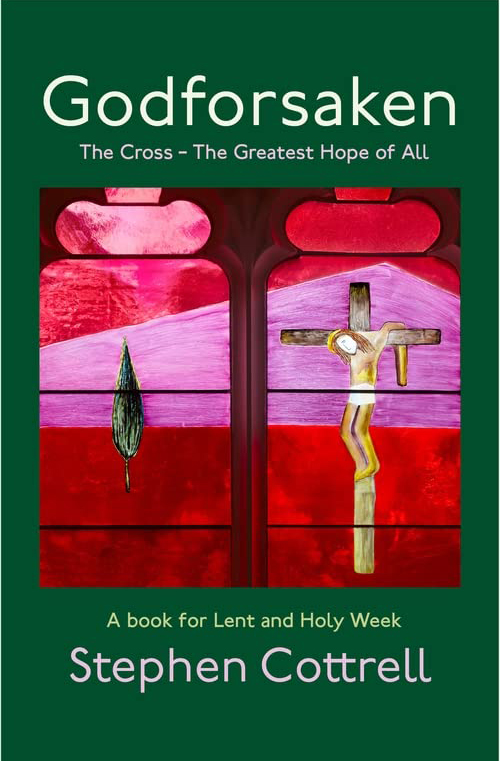 Godforsaken
Godforsaken
Author Stephen Cottrell
Publisher Hodder & Stoughton £14.99
Format hbk
ISBN 9781399805247
Subtitled ‘The Cross – The Greatest Hope of All’, the author, the present Archbishop of York, offers a series of reflections seeking ‘to reveal the deepest truth about God’s passionate involvement with the world he loves…’ He begins by quoting Jürgen Moltmann: ‘In the midst of the unbearable story of the passion of the world, we can discover the reconciling story of the passion of Christ.’ Across seven chapters drawing specifically on Mark’s Gospel, each ending with a set of questions, the author seeks to reveal that deepest truth.
Chapter One ‘It is wise to remember that Jesus didn’t speak English’ challenges the reader as to how we translate into the cultures and languages of today, the story, beliefs and values that we see and receive in Jesus Christ? The author notes correctly and sadly the potential for nuance and meaning being lost literally in Bible translations down through the years.
Chapter Two ‘My God, my God, why have you forsaken me?’ is the opening line of Psalm 22. The author challenges the reader to learn a Psalm (perhaps not starting with 119 though…) by heart as a way of beginning to restore ‘the spiritual and liturgical disciplines that were so much a part of the Christian formation of our forebears have fallen into disuse’. Bonhoeffer is quoted: ‘A Christian community without the Psalter has lost an incomparable treasure and by taking it back into use will recover resources it never dreamed it had.’
Chapter Three ‘Because Jesus’ terrible cry of dereliction is the opening line of Psalm 22 it leads us into this psalm in its entirety and helps us understand what the cross means.’ The author reminds us that this particular Psalm was sung (to the tune of The Deer of the Dawn) and that Jesus would have remembered singing it. The cross is real. It is horribly real. It is real horror and real pain… Yet in the midst of our own real pains when we worship, we are taken into something bigger than ourselves. For at worship’s heart, I believe, we find Jesus. William Temple is quoted: “To worship is to quicken the conscience by the holiness of God, to feed the mind with the truth of God, to purge the imagination by the beauty of God, to open the heart to the love of God, to devote the will to the purpose of God.”
Chapter Four ‘When Jesus cried out ‘Eloi, Eloi, lema sabachthani’ the people standing at the foot of the cross misunderstood him.’ The author reminds the reader that the one who has such a heart of love and was so moved with pity for those who were forsaken will himself become forsaken, unrecognised, unheard and misunderstood: he will, upon the cross, become the one who is abandoned. The author further reminds of the importance of understanding and receiving this as believers.
Chapter Five ‘The words that Jesus cries out as he dies are terrifying: My God, my God why have you forsaken me?’ The author challenges the reader to consider that ‘no amount of clever explaining away eliminates or reduces the stupefying horror that maybe, just maybe, in those final agonising moments Jesus himself stopped believing in God, stopped reckoning himself the Messiah, was utterly defeated and abandoned. Isn’t this what the words actually mean? Or is it? Is there something else?’ As one who is all for Archbishops and Bishops speaking out to the world around us, I equally appreciate them speaking out to the church and making us, the church, think and pray.
Chapter Six ‘As Jesus dies on the cross, Mark tells us there was darkness over the land (Mark 15.33).’ The author challenges us to meditate and wrestle with the thought that ‘God is forsaken by God… There is, if we can even begin to imagine such a thing, a kind of breakdown in the very life of the Trinity… We know that being human means being frail and mortal. We suffer. We die. God now knows that too.’ The book is worth it for this chapter alone.
Finally, Chapter Seven ‘Jesus’ howl of anguish from the cross is the cry of the human soul in all its suffering and the sign that our humanity in all its joy and sadness is taken into the life of God in the Trinity.’ The author challenges us to stand under the cross to understand it, recognises that understanding will always be elusive, yet knows that Jesus has created for us on and through the cross a relationship with God and that relationships only work when we enter into them.
I highly recommend this profound book to all and not just for reading during Lent and Holy Week. In my opinion, it does indeed reveal the deepest truth about God’s passionate involvement with the world He loves.
Reviewed by ANDREW CARR
Lent and Holy Week
